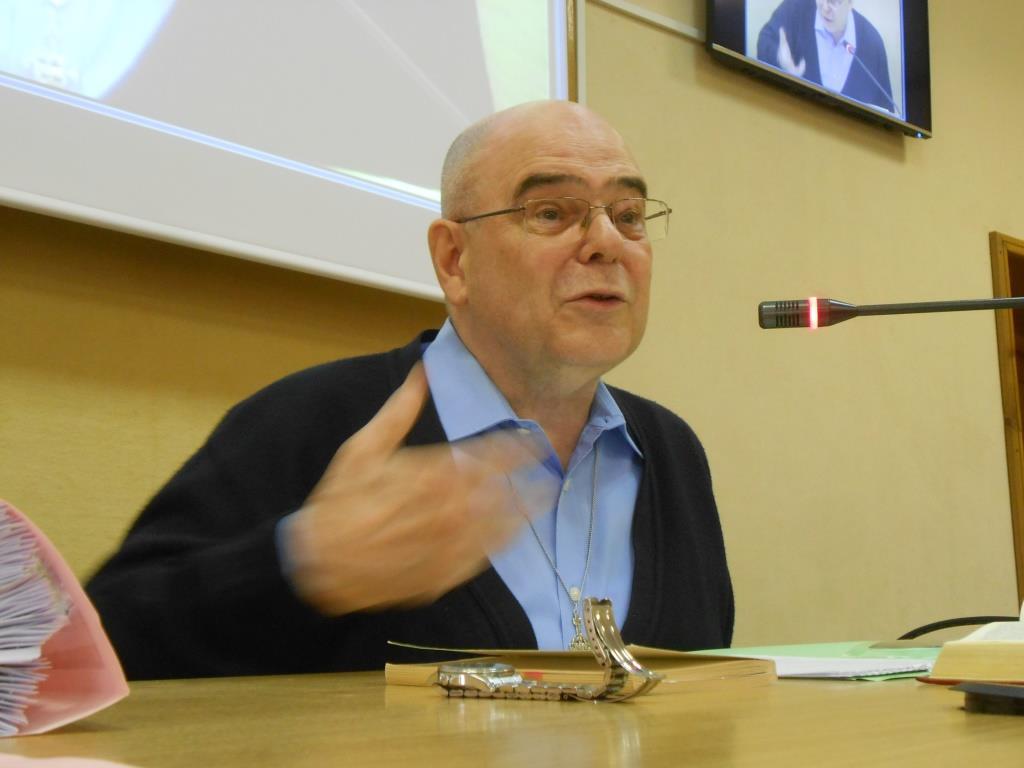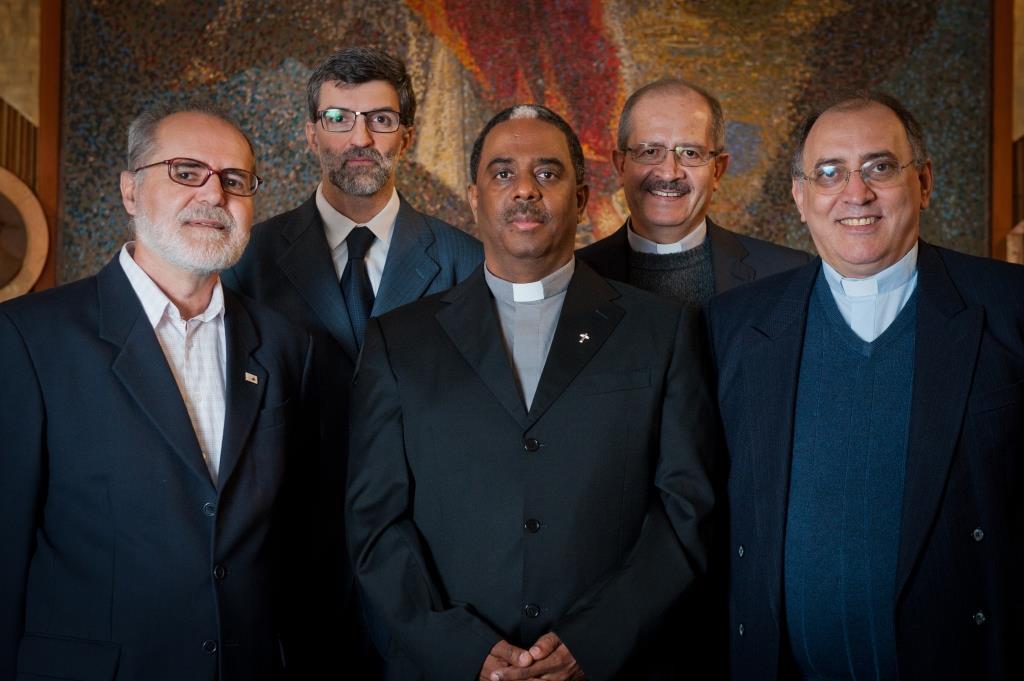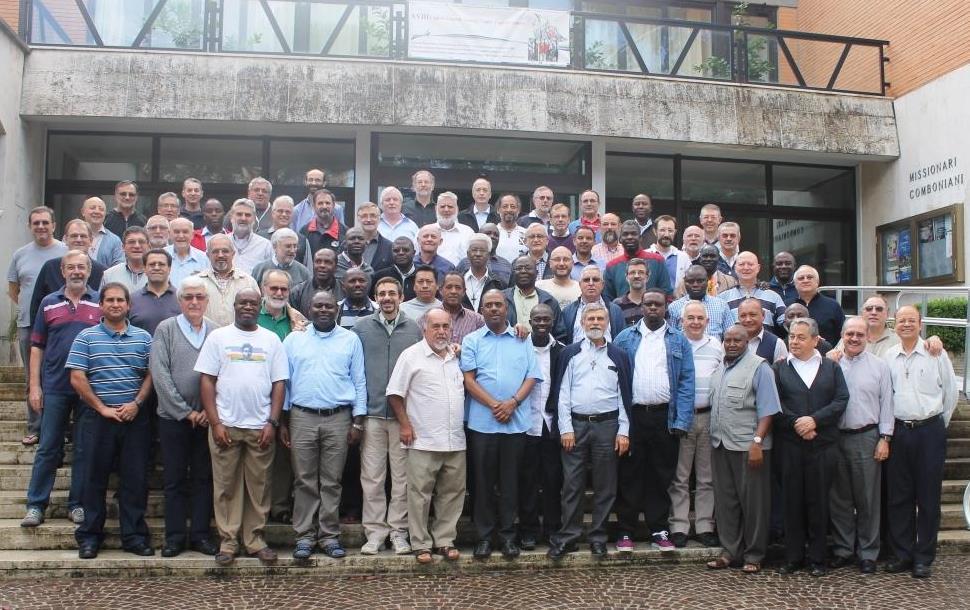Daniel Comboni
Comboni Missionaries
Institutional area
Other links
Newsletter
Wednesday, September 30, 2015
Respecting the schedule of the timetable for the XVIII General Chapter of the Comboni Missionaries, on Friday September 25 and Monday 28 the Assembly approved the final document of the Chapter. During these two days, the Chapter members discussed and voted point by point on the document, including the motions filed by individual delegates. It is a document of six thousand words (fifteen pages), rather short, enough to stimulate a renewed personal and collective commitment. Once it concluded the time of discernment and the approval of the final document, the Chapter Assembly yesterday launched the final phase of its work, that is, the election of the Superior General and his Council, preceded by half a day of recollection directed by Father David Glenday.
In the picture above,
Fr. David Glenday,
Comboni
missionary.
The approved document of the Chapter, inspired by the Evangelii Gaudium of Pope Francis, contains no revolutionary innovations, but it tries to highlight in a new language three fundamental aspects: Mission, Person and Reorganization.
On Mission, the document is an invitation to review the mission in the light of a number of criteria such as proximity to the poor, attention to the signs of the times, the real situation of each circumscription, the simplicity of lifestyle, etc. There is also the challenge to consider new forms of ministry which, by overcoming territorial boundaries, embrace more specialized commitments, as in the field of justice and peace and care of creation (JPIC), ethnic groups of pastoralists, indigenous peoples, cities’ peripheries. It was also confirmed that Europe is a mission territory like the other continents.
On the subject of the Person, the document highlights two fundamental issues: the growing multiculturalism of the Institute that impels us to re-express the charism in an international approach as it was intended by our founder Saint Daniel Comboni. Our circumscriptions and communities must be places where we learn to get along with the challenges of diversity.
Second aspect, the renewal of the Institute and its members need the re-appropriation of the specificity of the Comboni spirituality inspired by the image of Jesus as the Good Shepherd who lays down his life. Among the changes it was emphasized the importance of revising the Rule of Life so that its reformulation may better respond to the present day’s situation and the new paradigm of today’s mission.
As for the Reorganization of the Institute, the adopted document has highlighted, in line with the previous Chapters, the urgent need for a balance between personnel and commitments. This entails the reduction of our communities (40 in the next six years) and the progressive and gradual unification of the provinces with the aim to improve and qualify our service.
Theme of the half day of recollection directed by Fr. David Glenday
Mt. 20:17-28 and Rule of Life on authority and service
STRONG POINTS FOR EXERCISING LEADERSHIP
WITHIN THE CONTEXT OF THE ACTIONS AND TEACHINGS OF POPE FRANCIS
“May you always know how to exercise authority by accompanying,
understanding, helping and loving;
by embracing every man and every woman,
especially people who feel alone, excluded, barren,
on the existential margins of the human heart.
Let us keep our gaze fixed on the Cross:
there is found any authority in the Church,
where the One who is the Lord becomes a servant to the point of the total gift of himself”.
(Pope Francis)
The actions and teachings of Pope Francis are an invitation to a “conversion” of our service towards our brothers: a conversion of our personal actions, our relationships, our expectations and style of our mission.
They call us to accept and face the challenges of history and the problems of humanity with a positive attitude, one of kindness, discerning how wheat can grow, even in the midst of weeds, sharing in God’s love for humanity, in rebuilding confidence and allowing people to express themselves.
1. Conversion of personal attitudes
a) Service centred upon what is essential
The essential for us is Jesus Christ, bearing witness to the Gospel in accordance to the charism: with this faithfulness we support our brothers in following their way towards the Lord.
We are called to live as disciples as an essential and indispensable condition needed to carry out our mission, aware that we are “at the centre of this exchange of gifts”: with all that God has given us through faith, vocation, and charism we are called to share them with others….
Our commitment to life consists in identifying ourselves with Jesus, who put the individual at the centre, and used mercy and kindness, sharing the words and actions of a profound human nature and of forgiveness.
Only by living a profound union with Jesus and contemplating others may we follow as Jesus, the reality of Creation under his benevolent and respectful gaze.
b) A service whose authority lies within its authenticity
Each of us is called to preserve one’s inner freedom and to be oneself, without becoming stubborn to the dynamics of identity.
Our credibility is linked to how the words and actions correspond to the truth of life.
Our commitment is to free ourselves from the worldly symbols of power and the spirit of worldliness, bearing witness through a simple, humble and joyful lifestyle.
c) A service expressed through deep humanity
We are asked to peremptorily tackle the culture of rejection that may also affect our lives by recognising and making known the individual’s fundamental rights. We are called to gather up courage and express kindness, above all towards those more vulnerable. We must admit our sins and limitations and not expect to always have the right answer for everyone, rather patiently seek the truth together with the other brothers.
2. The conversion of relations
a) A service that is expressed in a simple and direct manner
We feel the importance of communicating in a modern way; of listening closely in order to learn the expressions that others can understand; of giving attention to forms of communication and their pedagogy, searching for and finding words with meaning, that touch the heart of individuals, so that they are close to their lives.
b) A service that is to “walk the streets of the world with our brothers and sisters”
We walk with our brothers, as Jesus with the disciples on the road to Emmaus:
- in front of them, to show the way and indicate the goal, looking towards the horizon with hope;
- behind them, stepping back with the weaker, taking care that no one is lost;
- among them, capable of fitting in with the rest of the group, because we too are on the path, with our struggles and joys, with our impulses and sins, with the same commitment of faithfulness to the vocation.
c) A service that searches for God’s will together with the brothers
We value the discernment and collegiality in order to increase communion, creating and consolidating the structures necessary for participation, knowing that discernment is a process that requires patience and time, listening and dialogue, inner freedom and the spirit of faith and courage to make decisions according to one’s responsibilities.
3. The conversion of the expectations and styles of the mission
a) A “prophetic” service
Through our actions and choices we attempt to capture the signs that encourage change, to express a prophecy, a vision of the future, a closeness to the poor.
We are called to live and bear witness in a more visible manner, through our concrete choices, the sign of brotherhood, which joins us with one another, overriding the temptation towards clericalism.
b) A service with the courage to “go out and invite others”
Let us accept the invitation to go out into the geographical and existential outskirts, in a vital dynamism of “going out” into the open roads of the Gospel, in a permanent state of the mission, freeing ourselves from every form of institutional or self-referential strictness, for “advancing along the path of a pastoral and missionary conversion which cannot leave things as they presently are” (Evangelii Gaudium 25).
c) A service that expresses and promotes a culture of encounter
We are called to promote and bear witness to a “culture of encounter” as a style of life and mission, with gestures of closeness especially towards the poor, the weak, and the ill who represent Christ’s flesh amongst us.
d) A joyful service, full of hope
We are called to rekindle the hope of our brothers, to warm the hearts, bearing witness of the courage to open un new paths, beyond those already consolidated and defined, daring to try new things, with faith and hope, in the creative faithfulness to the charism and courage of the Founders.
“Yet there is no greater freedom than that of allowing oneself to be guided by the Holy Spirit, renouncing the attempt to plan and control everything to the last detail, and instead letting him enlighten, guide and direct us, leading us wherever he wills.” (EG 280).
Authors of the summary:
Mario Aldegani,csj - Emili Turú,fms








